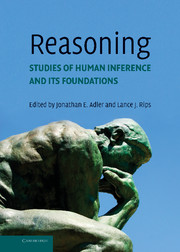Book contents
- Frontmatter
- Contents
- Preface
- List of Contributors
- Introduction: Philosophical Foundations
- PART I FOUNDATIONS OF REASONING
- Section 1 Some Philosophical Viewpoints
- 1 Change in View: Principles of Reasoning
- 2 Belief and the Will
- 3 Internal and External Reasons
- 4 Paradoxes
- Section 2 Fallacies and Rationality
- PART II MODES OF REASONING
- PART II INTERACTIONS OF REASONING IN HUMAN THOUGHT
- Index
2 - Belief and the Will
Published online by Cambridge University Press: 05 June 2012
- Frontmatter
- Contents
- Preface
- List of Contributors
- Introduction: Philosophical Foundations
- PART I FOUNDATIONS OF REASONING
- Section 1 Some Philosophical Viewpoints
- 1 Change in View: Principles of Reasoning
- 2 Belief and the Will
- 3 Internal and External Reasons
- 4 Paradoxes
- Section 2 Fallacies and Rationality
- PART II MODES OF REASONING
- PART II INTERACTIONS OF REASONING IN HUMAN THOUGHT
- Index
Summary
Can we rationally come to believe a proposition that is entailed neither by those we have believed heretofore nor by our previous opinions conjoined to the evidence before us? Discussing this question, William James quoted W. K. Clifford's statement (in “Ethics of Belief”) that it is wrong always, everywhere, and for everyone to believe anything on insufficient evidence. Arguing against this, James claimed that, in forming beliefs, we pursue two aims: to believe truth and to avoid error, and argued that the extent to which we pursue either at the cost of the other is a matter of choice: “he who says ‘Better go without belief forever than believe a lie!’ merely shows his own preponderant private horror of becoming a dupe. He may be critical of many of his desires and fears, but this fear he slavishly obeys …a certain lightness of heart seems healthier than this excessive nervousness [about error]. At any rate, it seems the fittest thing for the empiricist philosopher.”
In philosophy of science, until recently, something of this sort was regarded as part of the received view: general theories, such as Darwin's, Einstein's, or Bohr's, cannot be established on the basis of the evidence, but we may rationally come to believe that they are true. In addition, what we take as evidence itself is not indubitable, and we may later come to regard it as having been false.
- Type
- Chapter
- Information
- ReasoningStudies of Human Inference and its Foundations, pp. 47 - 59Publisher: Cambridge University PressPrint publication year: 2008



